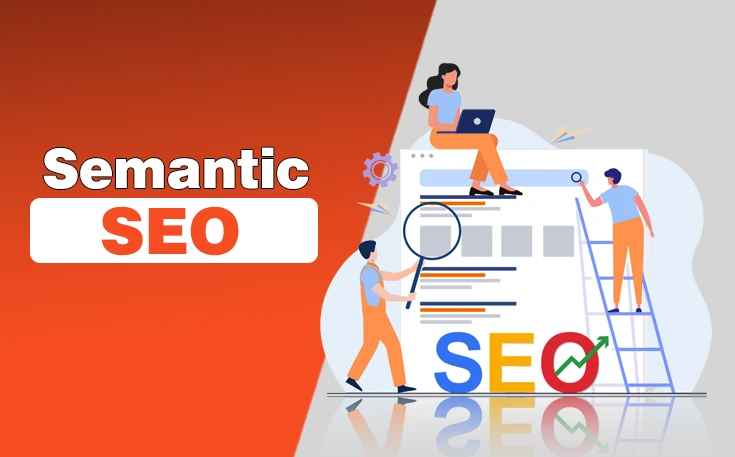
What Is Semantic SEO?
Search engines are no longer just matching keywords; they’re interpreting meaning. This shift has made Semantic SEO one of the most powerful strategies for achieving long-term visibility online. Instead of focusing only on exact phrases, Semantic SEO connects entities, topics, and relationships to deliver content that search engines and users both understand. By aligning your content with intent and context, you can rank for more queries, improve user engagement, and future-proof your website against algorithm changes.
Whether you’re a small business or a growing brand, Semantic SEO ensures your content stays relevant, authoritative, and competitive in today’s digital landscape.
For example, Google can distinguish between “Apple the fruit” and “Apple the brand.” By building content around semantic entities and concepts, websites reduce ambiguity and gain higher visibility. Semantic SEO makes your pages clearer to search engines and more useful to users.
Why Semantic SEO Matters in Today’s Search Landscape
Search engines now rank based on contextual relevance rather than keyword density. Algorithms like BERT and MUM allow Google to understand intent, improving search results accuracy. This makes Semantic SEO vital for businesses seeking sustainable rankings and user trust.
Adopting Semantic SEO boosts search intent optimization and user experience. Research by Google Search Central confirms comprehensive content performs better. Brands that adapt early enjoy higher engagement, stronger visibility, and future-proof SEO strategies.
How Search Engines Understand Semantics
Search engines use natural language processing (NLP) to decode meaning. They analyze sentence structure, entities, and connections. Google’s Knowledge Graph and machine learning updates help match queries with context, not just words.
This means a query like “best laptop for students” surfaces guides, comparisons, and reviews. Query understanding enables results that satisfy intent across varied search forms.
Semantic SEO vs Traditional SEO
Traditional SEO focuses on keywords and backlinks. Semantic SEO prioritizes semantic similarity, intent, and topical depth. It builds stronger authority by connecting ideas and offering a complete user journey.
For example, instead of just listing “best laptops,” semantic content explores features, use cases, and buyer needs. This creates context-driven SEO that Google rewards with higher rankings.
Key Benefits of Semantic SEO
Semantic SEO strengthens topical authority in SEO. By connecting entities and expanding coverage, your content ranks for hundreds of variations, not just one phrase. This increases organic visibility across multiple search terms.
It also improves user intent optimization. Comprehensive content keeps visitors engaged, reducing bounce rates and boosting conversions. Brands that use semantic strategies often see more durable ranking performance and better audience trust.
How to Implement Semantic SEO in Content Strategy
Perform Semantic Keyword and Entity Research
Go beyond surface-level keywords. Identify entities, synonyms, and semantic signals for SEO to build relevance. Tools like SEMrush and Ahrefs provide entity-based insights.
Build Topic Clusters and Pillar Content
Create a pillar page supported by cluster articles. Pillars build authority, while clusters strengthen semantic topic clusters. For example, a digital marketing guide links to SEO, PPC, and content strategy.
Use Structured Data and Schema Markup
Schema helps search engines interpret meaning better. Adding structured data and schema markup enhances visibility, improves click-through rates, and earns rich results.
Optimize for Intent and Voice Search
Voice search queries are conversational. Use long-tail queries and FAQs to align with voice search and semantics, making content accessible across multiple devices.
The Role of Entities, Topics, and Context
Entities are key in Semantic SEO. They act as anchors connecting content to real-world concepts. Building around semantic entities and concepts signals authority to search engines.
For example, a “fitness guide” should reference workouts, nutrition, benefits, and routines. This broad coverage strengthens contextual relevance and trustworthiness.
Common Mistakes in Semantics SEO
Many businesses misuse Semantics SEO by overstuffing synonyms. Others skip schema or publish isolated posts with no logical connections. These practices weaken authority.
Effective strategies require entity-based SEO, proper interlinking, and topical completeness. Shallow pages may rank temporarily, but they rarely sustain long-term growth.
Best Practices for Semantic SEO (By HA SEO Service)
- Build pillar pages with cluster support
- Use latent semantic indexing (LSI) keywords naturally
- Add schema for products, reviews, and FAQs
- Focus on search intent alignment
- Update content regularly for freshness
At HA SEO Service, we apply proven semantics frameworks that help clients rank higher and dominate competitive niches.
The Future of Semantic SEO
AI-driven search is reshaping SEO. Algorithms now prioritize entities, context, and relationships over keyword density. This makes Semantics SEO essential for long-term growth.
Businesses adopting semantic search optimization today will lead tomorrow. Aligning with Google’s future-ready systems ensures stable rankings and consistent organic visibility.
Conclusion
Semantics SEO unlocks stronger rankings, greater visibility, and lasting trust. By optimizing for entities, intent, and topical authority, brands gain a competitive edge in the search landscape.
Partner with HA SEO Service today to implement Semantic SEO strategies that future-proof your business and accelerate digital growth.
FAQs on Semantic SEO
1. What is Semantic SEO in simple terms?
It’s optimizing content for meaning, context, and intent rather than just keywords.
2. Does Semantic SEO replace traditional SEO?
No. It builds on traditional SEO but focuses more on contextual relevance and entities.
3. Why is Semantic SEO important for rankings?
It helps Google understand content better, improving rankings across multiple search queries.
4. How do I start with Semantic SEO?
Begin with entity research, topic clusters, schema markup, and intent-focused content.
5. Is Semantic SEO useful for small businesses?
Yes. It improves visibility, builds authority, and drives traffic even in competitive niches.
